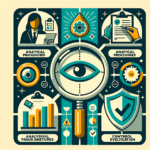Can Blockchain Technology Improve Internal Audit Processes?
Introduction: Rethinking Audits in the Digital Age
For many small business owners in India, the term “internal audit” often brings to mind a slow, expensive, and disruptive process. It’s a necessary task, but one that pulls valuable time and resources away from core business activities. But what if this process could be faster, more accurate, and less intrusive? The answer is part of a broader trend of How technology is transforming the internal audit process, and the key to this specific transformation lies in a technology that goes far beyond cryptocurrencies like Bitcoin. This article will explore how blockchain technology internal audit processes are set to create more efficient, secure, and trustworthy systems for businesses. We will demystify the technology, explore the shortcomings of traditional audits, and highlight the specific benefits that signal a major blockchain technology internal audit improvement India is on the horizon.
The Groundwork: Understanding Blockchain and Internal Audits
To appreciate the revolutionary potential of blockchain, it’s essential to first understand the two core concepts it brings together: the Primary Purpose of Internal Audit in the Modern Organization and the fundamental nature of blockchain itself. These building blocks will clarify why this technological pairing is so powerful for modern businesses.
What is an Internal Audit? A Quick Refresher
An internal audit is much more than a simple hunt for accounting errors. It’s a comprehensive evaluation designed to improve a company’s internal operations. For a small business, its primary goals are to:
- Safeguard Assets: Ensure that company resources, from cash to inventory, are protected from fraud, theft, and waste.
- Ensure Compliance: Verify that the business is adhering to all relevant laws and regulations, such as the Companies Act, GST laws, and other statutory requirements.
- Improve Operational Efficiency: Identify bottlenecks, streamline processes, and recommend improvements to make the business run more smoothly and profitably.
Essentially, it’s a health check-up for your company’s financial and operational processes, providing assurance to owners and management that everything is working as it should.
What is Blockchain Technology? Explained Simply
Forget the complex jargon for a moment. At its core, a blockchain is like a shared, digital, and unchangeable notebook (a ledger) that is copied and spread across a network of computers. Every time a new transaction happens, a new entry is made. This entry, or “block,” is cryptographically linked to the previous one, forming a “chain.”
Three key features make this simple concept so powerful:
- Decentralized: No single person or central authority (like a bank or government) owns or controls the notebook. Everyone on the network has a copy, creating a system built on collective agreement.
- Immutable: Once a transaction is recorded in a block and added to the chain, it cannot be altered or deleted. Trying to change a past entry would require changing every single subsequent block on every copy of the ledger in the network, which is practically impossible.
- Transparent: While the participants can be anonymous, the transactions themselves are visible to all participants on the network. This creates a single, shared source of truth that everyone can trust and verify independently.
Why Traditional Audits are Ripe for Disruption
The traditional audit process, while effective for decades, has inherent limitations that create risks and inefficiencies, especially in an increasingly digital world. These challenges are precisely what make blockchain technology such an appealing solution for auditors and business owners alike.
The Challenge of Sample-Based Testing
Auditors simply do not have the time or resources to examine every single transaction a company makes in a year. Imagine trying to verify every single invoice, payment, and inventory movement for a mid-sized retailer—it would be an impossibly large task. Instead, they rely on sample-based testing. They select a representative sample of transactions and scrutinize them, assuming that the sample reflects the health of the entire dataset. The major drawback is obvious: errors or deliberate fraud occurring outside of this selected sample can easily be missed, leaving the business exposed to significant risk.
The Risk of Data Manipulation and Human Error
Most businesses operate with multiple, often disconnected, software systems—one for accounting, another for inventory, and perhaps a separate one for sales. Data is frequently moved between these systems manually, creating numerous opportunities for human error. A simple typo can lead to significant discrepancies. More worryingly, these siloed and alterable digital records are vulnerable to deliberate manipulation. An employee could potentially alter sales figures in one system without it being immediately flagged in another, making it difficult for an auditor to detect fraud until significant damage has been done.
Time-consuming Reconciliation Processes
A huge portion of an auditor’s time is spent on reconciliation. This is the painstaking process of matching records from different sources to ensure they agree. Auditors must compare the company’s internal books with bank statements, confirm balances with customers and suppliers (third-party confirmations), and match inventory records with physical stock counts. This back-and-forth process is slow, labour-intensive, and a major driver of audit costs for any business. Any discrepancy requires a deep dive to find the source, further extending the audit timeline.
How Blockchain Technology Helps Audit Processes in India
By directly addressing the core weaknesses of traditional methods, blockchain offers a new paradigm for auditing. It shifts the process from a periodic, sample-based check to a continuous, comprehensive, and automated assurance system. Understanding how blockchain technology helps audit processes India is key to preparing your business for this next wave of financial innovation.
Providing a Single, Immutable Source of Truth
The most significant benefit of blockchain is the creation of a single, shared ledger that all parties can trust. When a transaction—such as a sale, a purchase order, or a payment—is recorded on the blockchain, it is time-stamped, cryptographically secured, and linked to the previous transaction. It cannot be secretly altered or deleted. For an auditor, this is a game-changer. Instead of spending weeks reconciling disparate records, they have access to a complete and verifiable audit trail from the very beginning. Disputes over “who did what and when” are eliminated because the blockchain provides an undisputed record.
Enabling Real-Time and Continuous Auditing
Traditional audits are retrospective; they look at what happened in the past quarter or year. Blockchain enables real-time or continuous auditing. Because transactions are verified and recorded on the ledger as they happen, they can be audited at the same time. An auditor can continuously monitor transactions against pre-defined rules and controls. This helps improve auditing efficiency using blockchain India by transforming the audit from a reactive, historical event into a proactive, ongoing process. Potential issues can be flagged and addressed instantly, not months after the fact.
Automating Verification with Smart Contracts
A “smart contract” is a self-executing contract where the terms of an agreement are written directly into lines of code that live on the blockchain. These contracts automatically execute actions when specific conditions are met.
Example: Imagine your business buys goods from a supplier. A smart contract could be created that holds your payment in escrow. The moment the shipping company’s blockchain records the delivery of goods to your warehouse, the smart contract automatically releases the payment to the supplier. For an auditor, this automates a crucial verification step. They don’t need to manually check for proof of delivery and payment receipts; the blockchain has already verified and executed the transaction according to the agreed-upon rules, providing a perfect, automated audit trail.
Enhancing Security and Reducing Fraud
The decentralized and cryptographic nature of blockchain makes it exceptionally secure. To fraudulently alter a transaction, a person would need to control more than half of the computers on the network (known as a 51% attack), which is nearly impossible on a large network. This inherent security drastically reduces the risk of financial statement fraud, unauthorized transactions, and asset misappropriation, reinforcing the legal framework around Fraud Reporting: Obligations of Auditors and Employees Under Section 143. These are some of the most critical internal audit processes blockchain benefits India, as it builds a foundation of trust and integrity directly into the company’s financial record-keeping system.
The Future: Blockchain Audit Technology Adoption in India
While the potential is enormous, the road to widespread blockchain audit technology adoption in India has both challenges and clear steps forward. For small and medium-sized businesses, understanding this landscape is crucial for future-proofing their operations.
Current Hurdles for Small Businesses
It’s important to have a realistic perspective. The complete shift to blockchain-based auditing won’t happen overnight, primarily due to a few key hurdles:
- Implementation Cost: Designing and implementing a private blockchain system from scratch can be a significant financial investment, often beyond the reach of smaller enterprises.
- Technical Expertise: There is currently a shortage of skilled developers and IT professionals who have deep expertise in blockchain technology, making it difficult to build and maintain these systems.
- Regulatory Clarity: While Indian government bodies and regulators are exploring blockchain’s potential, a comprehensive legal and regulatory framework specifically for blockchain-based financial reporting and auditing is still evolving.
The Path Forward and Getting Prepared
Despite these challenges, the trajectory is clear. The first step for business owners is not necessarily to implement a full blockchain system today, but to understand its potential and begin preparing. This means focusing on strengthening current digital practices to become “blockchain-ready.” This includes digitizing records, ensuring data integrity, and streamlining internal financial controls.
Professional bodies are already paving the way. The Institute of Chartered Accountants of India (ICAI), for example, is actively researching and creating resources to guide the profession. You can explore some of their work on their ICAI Digital Accounting and Assurance Board publications page. Staying informed about these developments will give your business a competitive edge.
Conclusion: The Inevitable Shift Towards a Smarter Audit
The limitations of traditional, sample-based auditing—its high costs, time-consuming nature, and vulnerability to error and fraud—are becoming increasingly apparent in our fast-paced digital economy. The answer to “Can blockchain technology internal audit processes be improved?” is a resounding yes. Blockchain offers a fundamental shift from retrospective investigation to real-time assurance. By providing an immutable, transparent, and automated ledger, it promises to make auditing more efficient, secure, and valuable than ever before.
While widespread blockchain audit technology adoption in India is still in its early stages, the foundational principles of good financial governance remain timeless. Ensuring your business’s financial health and compliance is critical today to be ready for the technology of tomorrow. Strengthen your internal processes with expert guidance. Contact TaxRobo for a consultation on our accounting, auditing, and GST compliance services to make your business audit-ready for the future.
Frequently Asked Questions (FAQ)
1. Is implementing blockchain for internal audits too expensive for a small business in India?
Currently, building a private blockchain from the ground up can be costly. However, the technology is evolving rapidly. “Blockchain-as-a-Service” (BaaS) platforms are emerging, which operate on a subscription model, potentially making it much more affordable in the future. For now, the best investment for a small business is to focus on understanding the technology’s potential and strengthening existing digital accounting processes.
2. How does blockchain specifically help with a tax audit (e.g., GST audit)?
Blockchain provides an incredible advantage for tax audits. It creates a clear, unalterable, and time-stamped record of every single transaction—including sales, purchases, and input tax credits. When a tax authority needs to verify your GST filings, you can grant them access to this immutable ledger. This makes it much easier to prove compliance, justify claims, and significantly reduce the time, cost, and friction associated with a tax audit.
3. Do my employees need to be blockchain experts to use it?
Absolutely not. Think about the internet—you don’t need to understand TCP/IP protocols to use a website. Similarly, future blockchain applications will be designed with user-friendly interfaces. Your employees will interact with simple software for their daily tasks like creating invoices or managing inventory, while the complex blockchain technology works seamlessly in the background to secure and record those transactions.
4. Is a blockchain-based audit legally accepted in India?
The legal and regulatory framework for blockchain is still developing globally, including in India. However, records stored on a blockchain are considered electronic evidence and are admissible in court under the Indian Evidence Act, 1872. While specific auditing standards have not yet been fully adapted to incorporate blockchain, regulatory bodies like the ICAI are actively working on creating the necessary guidelines for the future.



